#but point is: it's just more evidence for my “republic of god” theology
Explore tagged Tumblr posts
Text
"fate" represents the "rule of law" of the cosmic order, which even the gods are subject to. no one is above the law. not even zeus, the "king" of the universe.*
#*there is some debate (among me and myself) about whether or not zeus is totally subject to fate#but even if he wasn't 100% subject to it he is /generally/#and whenever he isn't it could just be interpreted as him declaring a state of exception#sorta like lincoln did during the civil war#sometimes it's necessary to step outside the law to preserve it#but point is: it's just more evidence for my “republic of god” theology#it's also worth noting that zeus has a unique relationship with the fates#if fate is the law then zeus would be the executive#the one responsible for executing the law#and we see him do that on a number of occasions -- dealing out the fates of people#not to mention that executing the law is essentially his responsibility as king of the universe and god of law and justice and cosmic order#so he doesn't get to dictate the law/fate but he does carry it out
1 note
·
View note
Link
Thanks to @londonjb for the lead.
This article explains a lot of the psychological motivations of the Prometheus Crew and David. Very long and may require a tea, coffee or whisky.
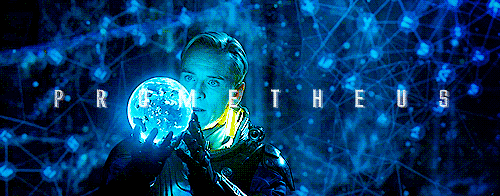
There's been a lot of speculation around Prometheus, mainly over whether certain elements of the plot constitute sloppiness on the parts of Damon Lindelof and Ridley Scott, or whether they are intentional elements of a puzzle film. In a way, the reception to the film is a lot like Blade Runner, and the film shares as much DNA with that Ridley Scott work as it does with Alien. In fact, I could imagine the three pictures now representing three points on a single timeline of future human history. Certainly, the interpretation of Phillip Dick's Replicants in Scott's Blade Runner and his portrayal of synthetic humans in Prometheus and Alien express certain misgivings over the nature of humanity and whether we are too immature to be creators of responsible entities. They are related metaphors from a single author.

The current brou-ha-ha in the web community is, of all things, "were the Engineers mad at humanity for killing Jesus?" I'm going to leave this to theologians who like science fiction. In short, this way-out-there question is based on the fact that parts of the facility in the film were about 2000 years old, and that Ridley Scott seems to have implied in a recent interview that he and Lindelof discussed whether Jesus was an Engineer sent to redirect humanity at the start of the Roman Empire. Much like the "Is Deckard a Replicant?" question from Blade Runner, this will provide fans with decades of debate that is largely besides the point. It is true that the film can be seen as a twisted spin on the New Testament, with wanderers arriving to an inhospitable desert sanctuary on Christmas Eve, an impossible birth announced by a sexless homunculus, isolation to a "manger" for an impossible delivery, an amoral potentate seeking miracles without redemptive faith, shattering of a "Temple Curtain," a resurrection of the Impossible Child from his tomb, and bodily assumption of the Mother into Heaven. The designation of the moonbase, LV 223, apparently leads to a verse in Leviticus (22:3) that has to do with defiling the Temple and angering the Israelite God. But again, these are matters beyond my ability to discuss them above a cocktail party level.

Instead, let's just deal with two main aspects of the film, and where psychiatric theories can give us insight and further appreciation of the narrative. Both concern the filmmakers' ideas about empathy versus individualistic survivalism. One thread runs through the relationship between the Engineers and Humanity, as illustrated by the puzzle in the film, the responses of different crew members to the Engineer trap being sprung, and Liz Shaw's story. The other thread concerns the very odd familial triad of Weyland, his daughter Vickers, and most importantly, the inhuman "child" David. I'll get back to this triad in the next diary, and touch back on Blade Runner and Alien in the process.

At its simplest level, the conflict between empathy and individualistic survivalism is one of sacrifice versus self-preservation. The latter has always seemed to be the evolutionary imperative, the "animal" nature of humanity, leaving empathy seemingly in the provenance of theology and certain secular philosophies. Even the early psychoanalysts saw the "base impulses" of Id to be primary, consuming and reproducing as the animals did, and the "civilizing influences" of Superego to magically appear through the ministrations of parents and societal rules. We are now just coming to challenge these notions in earnest, as we find brain circuits vital to a sense of feeling the pain of others, and realizing that they are highly overlapping with the social learning circuits that likely gave our hominid ancestors a literal "leg up" on the quadrapedal competition through the manufacture and instruction in tool making/use. Cognitive neuroscientists like Jean Decety have found that self-reflection, painful remorse, identification with others, social responsiveness and autognosis (understanding one's own emotional/cognitive state) are all dependent on some of the same cortical real estate, and that learning from others is intimately tied into all of this on a basic wiring level. Paleoanthropology has begun to debate to what extent our balance of individual autonomy and group dynamics gave us advantages over other primates, apes and hominids. Richard Leakey succinctly expresses this as the idea that a bipedal creature will have great evolutionary pressure to cooperate, as an asocial biped with a broken leg will not be likely to survive. It doesn't just take a village to raise a child, it takes a village to live long enough to conceive one.

On its surface, of course, Prometheus is a Von Daniken-Esque story that steals back the holiness of empathy from these scholars of human brains, development and evolution. We have these impulses because our creators were the kinds of beings who would kill themselves in order to seed new worlds. They were also white and blue eyed, but let's not get too far off track now. The thing is, the film never conclusively establishes that they made us. The mythos hints at their visiting periodically and influencing cultures, as well as having a change of heart sometime in the early Roman Imperial period (although the root cause may have been in Asia or Africa or America or everywhere at once). It also states clearly that they are related to us genetically, and by extension, to Bonobos and Chimps. The thing is, the mythos is open-ended enough that it doesn't negate what we know scientifically, and several characters raise the incongruity of Shaw's interpretation with known biology. She sees the DNA match as validating her theories, but it only establishes a common lineage. The Engineers may have been a culture of humans so far advanced that they left Earth tens of millennia prior. Ridley Scott states that the opening sequence is meant to establish the Engineers' psychology, rather than it showing what happened on Earth. They are seeding many worlds, and they have an aim for the hominids here on Earth. More than that we do not find out.

Thus, Von Daniken-Esque or not, the story is one of humanity falling short of loftier goals that involve the denial of self-preservation. This isn't just the Prometheus crew, or us chimps down here on Terra, but the Engineers of the LV 223 installation. The first we see them on LV 223, in a holo-playback, they are fleeing something. This something leads to widespread death and bodily defilement. It is the interaction of the bioactive muck with them that has led to this something. However, we know that the muck can do different things to different beings. It may have mutated some of the worms on the planet into body rending serpents. It turns the craven geologist into a rampaging wendigo gone amok. On the Engineer head with the panic center (locus ceruleus) activated, it is literally explosive, a dark mirror image to the gradual dissolve at the start of the film. And mixed with reproductive cells in humans, it leads to a rapidly gestating Xenomorph face hugger. At least one Xenomorph has already been unleashed by this process before the Prometheus gets there, as it is in a wall mural in the storage room, and this may have been the Something that hunted down the Engineers. But this is ostensibly the same (or similar) muck to the stuff at the start of the film, which is harsh but ultimately benevolent in result. Is the muck different, or does its effect depend on the user? What if the fear in the LV223 Engineers is what weaponized the substance? And conversely, what if the subtle effects of the substance on the Engineers made their motivations darker than that of their brethren? If they were as willing to die as their kinsperson at the beginning of the film, they could have launched a suicide mission, loaded up with the goop in their own bodies, and unleashed it upon landing and coming out of stasis. That isn't their plan. And that mural of the Xenomorph doesn't look like a warning. It looks like a shrine. Something is different about the psychology of these Engineers.

I wouldn't be a Science Fiction fan without my own pet theory. What if they never turned on us per se? What if they had some of this muck in select locations, away from most people's view, in various places on Earth? Then, whatever we did that was so messed up, whether it was unseating the Roman Republic, crucifying Jesus, destroying the Holy of Holies in Jerusalem (that's a good place to hide bioactive muck), having Russell Crowe fight Joaquin Phoenix, or some Dynastic Coup in China ... whatever it was polluted the goop with hostile intentions, and the Engineers took it to the LV 223 "Human-Engineer Visitor's Center" to see if they could fix it. This makes more sense than setting up a weapons facility on the moon to which they gave directions already. The Earth Embassy was retconned into a decontamination site for the Earth biomuck. This failed. It unleashed nightmarish biotech, but also changed the Engineers on the moon itself. At some point, the muck changed the thinking of the Engineers on that world, hence the mural deifying the Xenomorph and the stockpiling of the muck to unleash (or perhaps to venerate).

The best evidence for this failure of empathy on LV 223 is that one of the Engineers finally decides: "Screw this. I'm safe in this ship, so I'm going into stasis." When he comes out, he is not a high-minded angel. He is disappointed at Weyland, and responds by using the human's creation (David) as a blunt weapon. Now, he doesn't owe Weyland any more of an explanation than Dr Tyrell did for Roy Batty, when Roy had the same wish to look upon his creator and ask for more life. But when Tyrell hems and haws and refuses to try, we are supposed to see it as a flawed human move, and we almost sympathize with Batty's extreme reaction. Here, the clearly flawed being is the Engineer, and Shaw merely asks what went wrong. The Engineer believes itself to be above its creations, above its dead comrades, and above reproach. When it is stopped by an act of sacrifice by the Prometheus flight crew, it does not question its judgment of the little humans. It goes on a rampage to kill the human who questioned it. There is a lot of dialogue devoted to the flawed nature of David's creation and tutelage, but the implied narrative about creation is that our "guides" are also a decidedly mortal/flawed lot. David is the only character to explicitly state this, but the behavior of the Engineers, as much as it can be deciphered, is one of seemingly condemning behavior that they themselves are prone to carrying out. In a pinch, or under the effects of bad bioactive muck, or both, they opt for saving their own skins and lashing back at any and all who would threaten it.
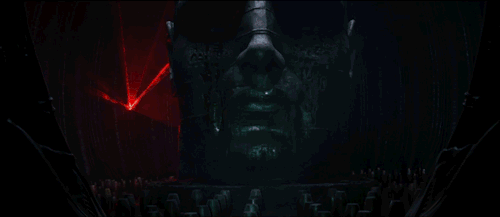
Maybe, then, the Engineers are the stand-in for the innate capacity for great acts in either direction. They are not the past, so much as what we could become. They are what we know instinctively is "in us." We can elect to take an inclusive view that sees all our acts, creations and neighbors as carrying pieces of us, and that leads to a wide net of preservation that may motivate us to act in a fashion that does not prioritize our own immediate interests or even our immediate safety. Or we can focus on threats, excluding others, attacking others, and seeing legacy in a very narrow light. As Pinker points out in "Better Angels of Our Nature," you can't take the group minded view if everyone around you is slashing their sword, so neither is automatically more adaptive. The flexibility to go back and forth is adaptive, so long as the overall trend among all people is towards the broader view. This is also not purely partisan, for those keeping score at home, although it is political. Here, most people would say, "Oh, we're progressives, so we take the altruistic view." Not when we focus on the threat from conservatives, and from my POV, rightly so. In fact, the "pearl clutchers" vs. "red meat progressive" arguments here are between the empathic vs. survivalist viewpoints. And I myself have alternated camps, depending on the item being debated.

But back to Prometheus, and how the crew of tiny people is as variable as the Engineers. With the exception of three members, the crew is representative of a humanity without mythos. Here at DailyKos, we might see this as a good thing, an Earth clear-eyed and unbound from ancient superstition. However, mythology is a good thing. As first articulated by Henry James and later by Carl Jung, myth provides metaphors for the unfathomable, and allows people to cope with capriciousness in life. Not everything can be known in one person's lifetime, and this will confound the person who lacks stories to root his or her experience. Failure to have a sense of one's own story at the end of life is associated with despair or desperate actions, as per Erikson, and this task is difficult to achieve without a broader cultural story. Carrying myths is not the same as substituting belief for knowledge, as secular individuals who avidly read speculative fiction have a cosmic mythos without any degree of faith in it. Prometheus' crew, for the most part, are not these kinds of secular individuals. They speak in terms of money, sex, power, and discoverable fact. Even Weyland, who has some degree of unscientific belief, does not want a cosmic framework for his life, only cosmic powers; he has not achieved Eriksonian ego integrity at the end, serving as an Ozymandias figure placed into space opera. It is really Shaw and her partner who strive to rediscover a mythos, and neither utilizes it to allow for mystery. They must have a personal relationship with the Engineers, which places them on equal footing. Given that the Engineers are not gods, this is logically reasonable, but in so far as they are inscrutable this is not a recipe for success. Perhaps we could even go so far as to say that the rise of personal-level theology and the decline of mystery about 2000 years ago is what caused the catastrophe with/among the Engineers.
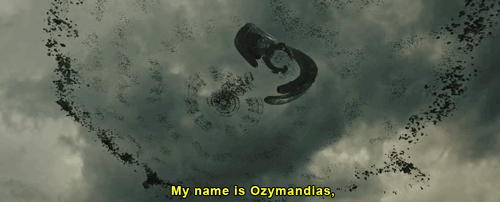
Many of the crew have been locked in by a lifetime of exposure to corporate materialism. The geologist is so set on his job that he is more frightened of the mission expanding into archeo-biomedicine than he is at the sight of the dead bodies or malevolent biotech, although the latter disturb him plenty. He has become overly specialized.

The biologist is almost a parody of how fundamentalists see many of us here, unwilling to challenge past theory and implicitly trusting of fauna that clearly looks sinister to us. Neither of them can see well anymore, nor critically examine information outside their training. No wonder we witness signal glitches and errant static and broken visors do them in: outside data is increasingly meaningless to their thought processes. And the LV 223 trap plays on their flawed singular-mindedness when it transforms them. The more motivated biologist is hollowed out by the creatures he wishes to study. The greedier geologist is transformed into a singular minded killing machine, mowing down anything living in his path.

Even the doctor, who does not meet a bitter end, merely acts as a functionary. Eventually, unquestioning of her directives, she is a willing pawn in David's side projects. She has become slave to a machine, less creative than a robot. There is no meaning left in any of these professionals' lives, a lack which is merely made explicit as the Prometheus mission goes off the rails. The corporation has hollowed out and stripped much of the empathic thinking from these people. More tragically, their survivalism is no longer individualistic, having been utilized by Weyland Corporation as a subversive means of control. Slavoj Zizek, a popular psychoanalyst and philosopher in Slovenia, has written volumes on the lack created by the modern materialist imperative to continually consume in the pursuit of individual enjoyment. I await his response to this element of the film, as I am pretty sure he will carry out an even more detailed analysis of it.

This control is not absolute, however, as the flight crew manages to break out of it. For much of the film, they speak flippantly about bets and sex and collector's items they have bought. They retaliate impotently against their female boss by using objectifying language, brought to a head by Idris Elba's captain challenging her humanity by daring her to have sex with him. If she can satisfy lust, then she's not a machine, recapitulating the erroneous thinking of the humans in Blade Runner. Even his devil-may-care warbling of "Love the One You're With," which elicited a chuckle from the audience, has a darker undertone that the sexual revolution has reached a flaccidly unsatisfying and meaningless hedonistic conclusion. To touch back to Freud, there is only Id craving other things, with atrophied Egos that cannot generate complete senses of autonomous selves. Yet, faced with the destruction of the planet, these men find something else to prize on it. We never know their individual motivations in detail, although the Captain speaks for a time on the imperative that the rest of humanity be able to go on. They will not receive things or even recognition for this. They will not collect on their bets with each other. It does not seem that they anticipate heavenly reward either, although they allude vaguely to "the other side." Instead, the idea that they share enough basic humanity with those back home is sufficient to trigger the "other circuitry" that acts in opposition to consuming and persisting. Even unrecognized, something of themselves will remain in distant and close relatives who will live to see another day. They cannot articulate it, but their bravery speaks it. And it is instinctual, whereas the other impulses have been reinforced by the civilization, in concert with more recent psychological theory that does not see one or the other impulse as more innate.

Let's finish by looking a bit at Shaw. She has been turned into an outsider by her own life circumstances. She has serially lost both parents as a child and has discovered she is infertile. Thus, she is cut off from the most immediate level of the biological thread early on. Her deeply held theories on human development are not widely accepted, as she must rely on an eccentric billionaire for funding (although the state of governmental grants is unclear in this world's backstory). Her talents do not readily bring her acclaim or power. There is nothing driving her other than personal satisfaction. She wants to be proven right, but since she already believes she is correct, data is always spun into confirming her narrative. There is very little narcissistic weakness for the world of 2089 to play off of and manipulate. That said, she is hardly concerned with humanity as a whole, except as a study piece. She and her partner form a pair walled off to some extent from others, and she herself seems largely walled off from instinct. The drive present is one to know. In some fashion, she is the character most alike to David, rather than Vickers.

According to Jeffrey Arnett, who formulated the concept of Emerging Adulthood about 20 years ago, the transition from adolescence to full adulthood in the modern age is one of determining where to live, what to do, and who to love. His ideas are an expansion on concepts of adult identity first articulated by the first generation of Freudians, as well as the young adult conflict of Intimacy vs. Isolation postulated by Erikson. This phase of development is supposed to be marked by repeated failure, as well as multiple breaks and rapprochement with the elder generation. Inability to have a solid sense of answers to the three lifestyle questions by the mid-30s is often associated with continued immaturity in interpersonal interactions and/or a midlife crisis. Shaw, who has been robbed of an elder generation and does not appear to have replacement proxies, has followed the example of her widowed father. There has never been a chance for rebellion. She sees her life's work as primary, which determines her partner and her world-traversing lifestyle. She enters her mid-30s without a hint of crisis, but also without much ability to interact with people outside her work. This is not the careerism present in the other crew, as she can think critically about a wide range of topics, but her social development seems frozen. She relies upon her partner as the spokesperson and interlocutor for much of the first half of the film. In fact, until the crisis reaches its climax, she almost appears to have a less rich emotional inner life than David (who as we will discuss in the next diary, is likely hiding his responses).

This changes as her partner is ripped from her. This not only challenges her assumptions about the benevolence of the Engineers, but strips her of her intermediary. She is exposed to the hostile world for the first time since the death of her father, making David's touch back to this event all the more cruel. Having opted for one clearly intimate relationship, she can choose total Isolation or find a way to rely on others. As she is betrayed by David, by the medical crew, by Vickers and Weyland, and by the Engineer, she relies more and more on her life's mission. Her quest for answers, never at odds with whatever the details of her Christian faith are, becomes even more central. And her Christian faith cannot be that of the literalist, even if she believes that Jesus and the Engineers are one and the same, as she has ideas clearly divergent from the account in Genesis. Pursuing that mission first takes her on a survivalist path, and then shifts to a more inclusive view.
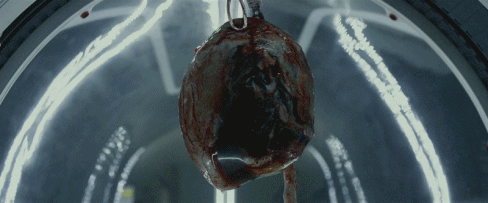
The medical bay Caesarean is a survivalist action in some ways but not others. On one level, she is the archetypal female action heroine, socking out anyone standing between her and the med bay. She endures pain and injury to live another day. However, here, it is an unearthly child that threatens to kill her. Her child, in a sense, as it shares some genetic material with her, or at the very least with that of her partner. But Shaw is uniquely qualified to recognize that this creature is an invader rather than part of a continuing biological thread, as she already sees herself as outside that ongoing chain. Since this is not reproduction, there is no primal level gain in sacrificing herself for it. I am shocked that the Fundamentalists have not seized on this scene as a grotesque of the Virgin Birth, but more surprised still that either side in the Culture Wars has not seen how this is a reflection of the zeitgeist as we confront questions of delivering or terminating pregnancies with foreknowledge of congenital/genetic malformations. The dedicated modern woman, with an adult existence centered outside of home and hearth, who elects to live another day rather than bring something she does not recognize as hers into this world. This is not to boil down difficult questions to simple science fiction struggles for life and death: no potential mother (or her partner) can see any real world pregnancy as merely an alien invader. Nonetheless, uncanny narrative threads in horror or gothic or any speculative story where reality's rules are suspended ends up reflecting that which cannot be spoken of comfortably in the real world. This is what Freud called Unheimlich, which means both Uncanny and "The Un-Hidden." This pregnancy, both enabled and poisoned by the Man of Technology (who is also a Corporate Man!), is only a terrible choice thrust upon her. And she must rely upon yet more corporate technology to save her, which she must both appropriate forcibly and then convince/reprogram to do the job. Is this not the impossible nightmare our moral arguments and advanced knowledge have thrust upon every woman, the seemingly barren and the fertile alike? Even now, do we not hear the Corporatist funded scolds redirecting women and their physicians to always choose measures to bring every pregnancy to delivery, like David and his effortless take-over of the Weyland med crew? Even in nations where access is not an issue and pollution is being addressed, is the foreknowledge we can now have not the genesis of such nightmares, made all the more scary by the fact that the developing fetus is part of our biological chain? This is survivalism turned in on itself.
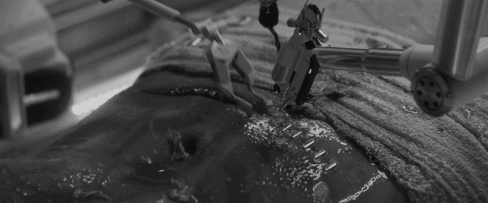
Having made the terrible choice to rip a creature from her womb, Shaw is now met with almost preternatural calm by David, Vickers and Weyland. She is not taken back to the cryo-beds, nor arrested, or even reprimanded. Weyland is more concerned with her accompanying them on his quest for more life. The corporation and its godhead must persist. The implied option is: "If you will not bear a child for the corporation, will you nurture the corporation itself? If you will not act solely for yourself, can you broaden your worldview to support me?" However, these are purchases, not empathic pleas. Weyland does not come as the weary senescent in need of help. He announces that this has been his plan, that he is in control. Having just come from one crisis of modern feminism, are we now not smack dab in the middle of the other? If you will not bear a child, then you must be a company man. This is also the crisis of our aging population, where so much of the work is now in health care and elder care. Vickers and David are along for the ride, both for their own ends, and we will return to this in the next installment. But neither accompanies Weyland entirely because they want to take care of him, even though David has followed his programming and been attentive. They have farmed this work out to others: the scientists, the crew, the technology, the medics, and the Engineer. People who take "pink collar" jobs in our world may often start off entirely fueled by empathy and purpose, but can quickly get drawn into much more materialistic and unempathic motivations. This is survivalism masquerading as an emphatic plea. Shaw does not take the bait, agreeing to go along but beginning to remember her core motivations.
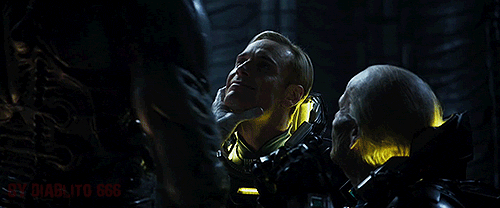
Everything changes when she witnesses the battle between the Engineer and Weyland. Denied his individualist/survivalist aims, Weyland is struck down by the Engineer, who is unimpressed with the narcissistic achievement of arriving to wake him up. Nevertheless, the Engineer is no less driven by the same instincts, refusing to engage in a discussion about actions/morals and simply maneuvering to continue his own existence. False gods abound in this room of mere mortals. Remembering her discussion with the Captain, and how his motivations are already in the process of change, she takes a chance and reaches out to another for help. She asks him to make a sacrifice that only he can, on behalf of countless people that neither of them will see again. And then, she takes an even bigger risk, providing David with a chance to help her and offering to help him. It is at this point that she regains her cross, lost when she was first infected with the growing invader within her. She has begun to participate in a genuine dialogue with others, offering assistance that may not be reciprocated and making requests that may not be fulfilled. She trusts not just in her life's mission, but in others that she is not intimate with, others who have betrayed her before. She does this because it is the only way to allow for Earth to survive, and as it turns out, her bet pays off for herself and for Earth. Ironically, the purely survivalist Xenomorph Facehugger acts as the Deus Ex Machina, bringing the corrupted Engineer to his end in the same way he had denied Weyland further existence. But it acts in its singular minded way, as it has no empathic instincts.
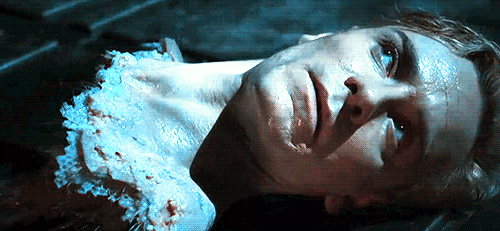
In the end, Shaw's growth and reconnecting to her full human nature allows David to learn the benefit of an empathic sense. The Immortal Man made Invalid, he is now the homunculus with broken legs, dependent on another person to help him along. Without him, Shaw cannot achieve her more intellectual mission; without her, David has life without further experience. We have seen the theoretical dawn of human empathy reborn, its survival advantage spelled out for us. This recapitulates the pre-denouement of Blade Runner with Deckard and Batty, but with a happier resolution for both actors, and stands in contrast to Alien where Ripley is left alone. In the next diary, we will go back and review the unhappy family of Vickers, Weyland and David, and speak of narcissism and malignant narcissism in more detail. In the process, we will see how such persons (corporate and human) that lack a full capacity for a sense of the other loom large as chief antagonists in Prometheus and our own world.
By Ptolemy Thursday Jun 21, 2012 · 3:56 AM AUSEST
Part II
#prometheus#david 8#meredith vickers#sir peter weyland#janek#ravel#chance#ford#elizabeth shaw#charlie holloway#alien prequel#alien movie#alien franchise#space horror#science fiction#scifi horror
7 notes
·
View notes
Text
CS Lewis
God In The Dock
Philosophy Opinion (Published) Keywords: C.S. LEWIS; BULVERISM; REASON; WILL Source: William B. Eerdmans Publishing Co., Grand Rapids, MI Published: 1970; 1994 Author: C. S. Lewis
“Bulverism” is a term coined by C.S. Lewis to describe the state of public discourse and debate in the 20th century, or, as he also meant to convey by the term, the foundation of 20th century thought. “Bulverism” is a malady, if you will, which is alive and well, even rampant, here among we denizens of Free Republic. I personally can think of only a very few FReepers who have never succumbed to its blandishments, and I ain’t one of them. Enter here at your own risk.
“Bulverism”
It is a disastrous discovery, as Emerson says somewhere, that we exist. I mean, it is disastrous when instead of merely attending to a rose we are forced to think of ourselves looking at the rose, with a certain type of mind and a certain type of eyes. It is disastrous because, if you are not very careful, the color of the rose gets attributed to our optic nerves and its scent to our noses, and in the end there is no rose left. The professional philosophers have been bothered about this universal black-out for over two hundred years, and the world has not much listened to them. But the same disaster is now occurring on a level we can all understand.
We have recently “discovered that we exist” in two new senses. The Freudians have discovered that we exist as bundles of complexes. The Marxians have discovered that we exist as members of some economic class. In the old days it was supposed that if a thing seemed obviously true to a hundred men, then it was probably true in fact. Nowadays the Freudian will tell you to go and analyze the hundred: you will find that they all think Elizabeth [I] a great queen because they all have a mother-complex. Their thoughts are psychologically tainted at the source. And the Marxist will tell you to go and examine the economic interests of the hundred; you will find that they all think freedom a good thing because they are all members of the bourgeoisie whose prosperity is increased by a policy of laissez-faire. Their thoughts are “ideologically tainted” at the source.
Now this is obviously great fun; but it has not always been noticed that there is a bill to pay for it. There are two questions that people who say this kind of thing ought to be asked. The first is, are all thoughts thus tainted at the source, or only some? The second is, does the taint invalidate the tainted thought - in the sense of making it untrue - or not?
If they say that all thoughts are thus tainted, then, of course, we must remind them that Freudianism and Marxism are as much systems of thought as Christian theology or philosophical idealism. The Freudian and Marxian are in the same boat with all the rest of us, and cannot criticize us from outside. They have sawn off the branch they were sitting on. If, on the other hand, they say that the taint need not invalidate their thinking, then neither need it invalidate ours. In which case they have saved their own branch, but also saved ours along with it.
The only line they can really take is to say that some thoughts are tainted and others are not - which has the advantage (if Freudians and Marxians regard it as an advantage) of being what every sane man has always believed. But if that is so, we must then ask how you find out which are tainted and which are not. It is no earthly use saying that those are tainted which agree with the secret wishes of the thinker. Some of the things I should like to believe must in fact be true; it is impossible to arrange a universe which contradicts everyone’s wishes, in every respect, at every moment. Suppose I think, after doing my accounts, that I have a large balance at the bank. And suppose you want to find out whether this belief of mine is “wishful thinking.” You can never come to any conclusion by examining my psychological condition. Your only chance of finding out is to sit down and work through the sum yourself. When you have checked my figures, then, and then only, will you know whether I have that balance or not. If you find my arithmetic correct, then no amount of vapouring about my psychological condition can be anything but a waste of time. If you find my arithmetic wrong, then it may be relevant to explain psychologically how I came to be so bad at my arithmetic, and the doctrine of the concealed wish will become relevant - but only after you have yourself done the sum and discovered me to be wrong on purely arithmetical grounds. It is the same with all thinking and all systems of thought. If you try to find out which are tainted by speculating about the wishes of the thinkers, you are merely making a fool of yourself. You must find out on purely logical grounds which of them do, in fact, break down as arguments. Afterwards, if you like, go on and discover the psychological causes of the error.
In other words, you must show that a man is wrong before you start explaining why he is wrong. The modern method [Note: This essay was written in 1941.] is to assume without discussion that he is wrong and then distract his attention from this (the only real issue) by busily explaining how he became to be so silly. In the course of the last fifteen years I have found this vice so common that I have had to invent a name for it. I call it “Bulverism.” Some day I am going the write the biography of its imaginary inventor, Ezekiel Bulver, whose destiny was determined at the age of five when he heard his mother say to his father - who had been maintaining that two sides of a triangle were together greater than the third - “Oh, you say that because you are a man.” “At that moment,” E. Bulver assures us, “there flashed across my opening mind the great truth that refutation is no necessary part of argument. Assume your opponent is wrong, and then explain his error, and the world will be at your feet. Attempt to prove that he is wrong or (worse still) try to find out whether he is wrong or right, and the national dynamism of our age will thrust you to the wall.” That is how Bulver became one of the makers of the Twentieth Century.
I find the fruits of his discovery almost everywhere. Thus I see my religion dismissed on the grounds that “the comfortable parson had every reason for assuring the nineteenth century worker that poverty would be rewarded in another world.” Well, no doubt he had. On the assumption that Christianity is an error, I can see clearly enough that some people would still have a motive for inculcating it. I see it so easily that I can, of course, play the game the other way round, by saying that “the modern man has every reason for trying to convince himself that there are no eternal sanctions behind the morality he is rejecting.” For Bulverism is a truly democratic game in the sense that all can play it all day long, and that it give no unfair advantage to the small and offensive minority who reason. But of course it gets us not one inch nearer to deciding whether, as a matter of fact, the Christian religion is true or false. That question remains to be discussed on quite different grounds - a matter of philosophical and historical argument. However it were decided, the improper motives of some people, both for believing it and for disbelieving it, would remain just as they are.
I see Bulverism at work in every political argument. The capitalists must be bad economists because we know why they want capitalism, and equally Communists must be bad economists because we know why they want Communism. Thus, the Bulverists on both sides. In reality, of course, either the doctrines of the capitalists are false, or the doctrines of the Communists, or both; but you can only find out the rights and wrongs by reasoning - never by being rude about your opponent’s psychology.
Until Bulverism is crushed, reason can play no effective part in human affairs. Each side snatches it early as a weapon against the other; but between the two reason itself is discredited. And why should reason not be discredited? It would be easy, in answer, to point to the present state of the world, but the real answer is even more immediate. The forces discrediting reason, themselves depend of reasoning. You must reason even to Bulverize. You are trying to prove that all proofs are invalid. If you fail, you fail. If you succeed, then you fail even more - for the proof that all proofs are invalid must be invalid itself.
The alternative then is either sheer self-contradicting idiocy or else some tenacious belief in our power of reasoning, held in the teeth of all the evidence that Bulverists can bring for a “taint” in this or that human reasoner. I am ready to admit, if you like, that this tenacious belief has something transcendental or mystical about it. What then? Would you rather be a lunatic than a mystic?
So we see there is justification for holding on to our belief in Reason. But can this be done without theism? Does “I know” involve that God exists? Everything I know is an inference from sensation (except the present moment). All our knowledge of the universe beyond our immediate experiences depends on inferences from these experiences. If our inferences do not give a genuine insight into reality, then we can know nothing. A theory cannot be accepted if it does not allow our thinking to be a genuine insight, nor if the fact of our knowledge is not explicable in terms of that theory.
But our thoughts can only be accepted as a genuine insight under certain conditions. All beliefs have causes but a distinction must be drawn between (1) ordinary causes and (2) a special kind of cause called “a reason.” Causes are mindless events which can produce other results than belief. Reasons arise from axioms and inferences and affect only beliefs. Bulverism tries to show that the other man has causes and not reasons and that we have reasons and not causes. A belief which can be accounted for entirely in terms of causes is worthless. This principle must not be abandoned when we consider the beliefs which are the basis of others. Our knowledge depends on our certainty about axioms and inferences. If these are the results of causes, then there is no possibility of knowledge. Either we can know nothing or thought has reasons only, and no causes.
[The remainder of this essay, which was originally read to the Socratic Club before publication in the Socratic Digest, continues in the form of notes taken down by the Secretary of the Club. This explains why it is not all in the first-person, as is the text-proper.]
One might argue, Mr. Lewis continued, that reason had developed by natural selection, only those methods of thought which had proved useful surviving. But the theory depends on an inference from usefulness to truth, of which the validity would have to be assumed. All attempts to treat thought as a natural event involve the fallacy of excluding the thought of the man making the attempt.
It is admitted that the mind is affected by physical events; a wireless set is influenced by atmospherics, but it does not originate its deliverances - we’d take no notice of it if we thought it did. Natural events we can relate one to another until we can trace them finally to the space-time continuum. But thought has no father but thought. It is conditioned, yes, not caused. My knowledge that I have nerves in inferential.
The same argument applies to our values, which are affected by social factors, but if they are caused by them we cannot know that they are right. One can reject morality as an illusion, but the man who does so often tacitly excepts his own ethical motive: for instance the duty of freeing morality from superstition and of spreading enlightenment.
Neither Will nor Reason is the product of Nature. Therefore either I am self-existent (a belief which no one can accept) or I am a colony of some Thought and Will that are self-derived from a self-existent Reason and Goodness outside ourselves, in fact, a Supernatural.
Mr. Lewis went on to say that it was often objected that the existence of the Supernatural is too important to be discernible only by abstract argument, and thus only by the leisured few. But in all other ages the plain man has accepted the findings of the mystics and the philosophers for his initial belief in the existence of the Supernatural. Today the ordinary man is forced to carry that burden himself. Either mankind has made a ghastly mistake in rejecting authority, or the power or powers ruling his destiny are making a daring experiment, and all are to become sages. A society consisting solely of plain men must end in disaster. If we are to survive we must either believe the seers or scale those heights ourselves.
Evidently, then, something beyond Nature exists. Man is on the border line between the Natural and the Supernatural. Material events cannot produce spiritual activity, but the latter can be responsible for many of our actions in Nature. Will and Reason cannot depend on anything but themselves, but Nature can depend on Will and Reason, or, in other words, God created Nature.
The relation between Nature and Supernature, which is not a relation in space and time, becomes intelligible if the Supernatural made the Natural. We even have an idea of this making, since we know the power of imagination, though we can create nothing new, but can only rearrange our material provided through sense data. It is not inconceivable that the universe was created by an Imagination strong enough to impose phenomena on other minds.
It has been suggested, Mr. Lewis concluded, that our ideas of making and causing are wholly derived from our experience of will. The conclusion usually drawn is that there is no making or causing, only “projection.” But “projection” is itself a form of causing, and it is more reasonable to suppose that Will is the only cause we know, and that therefore Will is the cause of Nature.
A discussion followed. Points arising:
All reasoning assumes the hypothesis that inference is valid. Correct inference is self-evident. “Relevant” (re evidence) is a rational term. The universe doesn’t claim to be true: it’s just there. Knowledge by revelation is more like empirical than rational knowledge.
Question: What is the criterion of truth, if you distinguish between cause and reason? Mr Lewis: A mountainous country might have several maps made of it, only one of which was a true one; i.e., corresponding with the actual contours. The map drawn by Reason claims to be that true one. I couldn’t get at the universe unless I could trust my reason. If we couldn’t trust inference we could know nothing but our own existence. Physical reality is an inference from sensations.
Question: How can an axiom claim self-evidence any more than an empirical judgment on evidence?
[The essay ends here, leaving this question unrecorded.]
0 notes
Video
youtube
(via https://www.youtube.com/watch?v=REehTyC7A5M)
COMMENTARY:
Romans 4:13 is the evidence that Paul did not invent Christianity but that this apology for his theology originates in Genesis 15:6. This is the basis of N.T. Wright's observation that Paul's epistemology is a brand new way of thinking. I stipulate completely with Bishop Wright's explication of Romans relative to this epistemology. And,, generally, to both his and Bruce Gore's theology. I lean towards the Anglican doctrine because it is organized around horizons beyond Revelation 22 as opposed to the boundaries of Solo Scriptura.
Just for the record, the numbers are divine neon signs to me: 4 is the number of the physical universal, Matter, and 13 is the number of the finger of God, as in a lightning strike. 500 years ago, the Holy Spirit guided the hands of the typesetters to arrange these numbers in this way so that someone like me would trip over them in the way I have. 4:14 reduces to 4:4 and I could build a narrative around this and Obama, but I won't, but it also signals a doubling important to verify the presence of the Holy Spirit in the verse, thought and purpose of the text. And it happened at this moment in history when I can validate the moral integrity of the interpretation and presentation of Paul's theology of both you and Wright. I am just the messenger but what you are teaching is Truth.
Combat soldiers know all about Glory. Glory is what happens on the other side of Duty in those extreme environments where Yaweh, Queen of Battle, out in front like a Valkyrie, Her ululations commanding “Follow Me! Come to Jesus! Follow Me! This is not a drill! Follow Me!”. There is a reason why Athena’s helmet is on the West Point coat of arms: Athena/Minerva was the Roman Queen of Battle.
nd the task environment is the realm of Glory. Glory occurs in other circumstances of the human condition. A woman in labor is in Glory, bearing down. It’s a loss of ego, a forgetfulness of self. The Shakers found glory in the simple things, hands to work, heart to God. Everything Paul has to say about the rewards of the Christian life apply, but the Roman soldiers who crucified Jesus were acquainted with Glory even as they escorted Jesus to His. “Not in all of Israel have I found such faith!”. Jesus was astonished twice in Matthew: once at the centurion’s faith and once at the unbelief in His hometown of Nazareth.
The relationship of Jesus to the Roman soldier as a member of a community of faith is summed up in John 15:13: Greater love hath no man but that he lay down his life for his friends. Agape is the social context of the infantry squad within the instrumental context of the priorities of Duty: Mission-Men-Self. One of the drivers in the daily suicide rate of 22 veterans is the loss of this social context when they go into the civilian community, which the late election demonstrated as being toxic as a direct result of deliberate polarization by the Trump campaign as the current most successful iteration of Newt Gingrich’s employment of the Trotsky insurgency process as a political weapon. Combat veterans are accustomed to having somebody at their back, but it doesn’t happen in the civilian community. Soldier’s fall on grenades on the basis of John 15:13 within the context of Duty, but the reality in the American civilian culture are infinite variations on Survivor and voting yourself off the island is a rational response.
As much as anything, Faith in the military community, is the bias to act on the expectation of divine intervention: you don’t pray for miracles so much as you plan for them. Faith is far more structural in the Army than in the civilian community but it is measured existentially instead of invoked. All the ribbons on the chest of all military servants is a measure of their individual faith against the metrics of Duty, Tradition and Honor. For a community that depends upon John 15;13 as a force multiplier, these ribbons are their own Gospel narrative consistent our constitutional milieu. Atheists, Libertarians and anti-Theists who claim we are not a Christian nation are misleading themselves, but it is not the Christianity of Solo Scriptura but the epistemology of a Paul’s new way of thinking, the generosity of spirit in John 15:13 and the economics of Jesus found in Mark 9:37, all of which were ignored by Antonin Scalia’s “original intent” interpretation. Faith is the desire to seek Glory as a powerful channel of God, to do His Will in my world and create the Kingdom of Heaven at the tips of my fingers as a work in progress. Grace as the great gift of Faith is the Gospel Paul brings to Rome and the Praetorian Guard. Republican military service within our constitutional milieu is an expression of Christian Stewardship. This is the basis of the 2nd Amendment, the constitutional authority for the systematic education and training of citizen soldiers. The Framers expected citizens to submit to military schooling on the same basis as Switzerland and Israel of the modern republic.
The sacrifice of Isaac is a study in the nature of Duty, a response to Romans 11:22. There are a lot of theories that Abraham knew that God would not require him to spill Isaac’s blood that are mistaken. Abraham was given an order by Yaweh, Queen of Battle, and Abraham responded Yes, Sir! No, Sir! How High Up, Sir? Hope is not a method and Abraham went about immediately to methodically prepare to spill Isaac’s blood and offer his flesh up as a burnt offering. Isaac was 37 years old. He thought he was going on a camping trip with dad, but dad was going to kill him.
Again, this was something the Roman soldiers understood. On his way to the Tehran conference, George Marshall stopped off in Italy to visit his son’s grave. Infant is the Latin root for both baby and foot soldier. I have heard a legend of a Roman general who referred to his soldiers as “my children” and the label stuck. I don’t know, but the nature of Duty for the republican solder in a constitutional milieu is the sacrifice of Isaac as a by-product of Faith. Vietnam was a long, sad time for the Army community as Duty drew upon Glory to to accomplish God’s Will. The Roman soldiers understood exactly Abraham’s submission to Duty.
0 notes